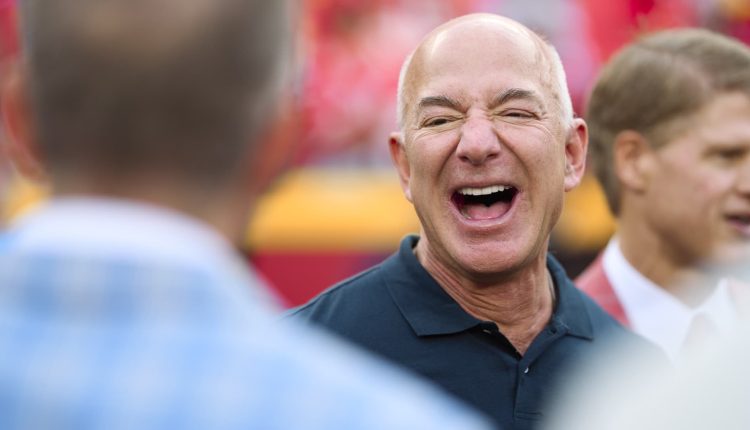Jeff Bezos looks on from the sidlines before kickoff between the Kansas City Chiefs and Los Angeles Chargers at GEHA Field at Arrowhead Stadium on September 15, 2022 in Kansas City, Missouri. The Amazon founder and chairman is one of the world’s richest men.
Cooper Neill | Getty Images Sport | Getty Images
The world’s five richest men have more than doubled their vast wealth since 2020, according to an Oxfam report, as the charity calls for curbs on “corporate power.”
The report found that the combined fortune of the world’s wealthiest people — Tesla CEO Elon Musk, LVMH boss Bernard Arnault and family, Amazon founder Jeff Bezos, Oracle founder Larry Ellison, and veteran investor Warren Buffett — has jumped from $405 billion in March 2020 to $869 billion in November 2023. Oxfam used data from Forbes and Wealth X which has not been independently verified by CNBC.
Oxfam’s report was published Monday to coincide with the start of the latest World Economic Forum Annual Meeting, which sees the so-called global elite of top business and political leaders meet in Davos, Switzerland, although the five billionaires named in the report are not due to attend.
Seven of the world’s ten biggest companies have a billionaire as their CEO or main shareholder, the report found. Meanwhile, the world’s richest 1% of people own 43% of global financial assets, according to the research, such as publicly listed instruments like stocks and bonds, along with stakes in privately-held businesses.
“If current trends continue, the world will have its first trillionaire within a decade but poverty won’t be eradicated for another 229 years,” Oxfam said.
The charity also highlighted that net profit among 148 of the world’s biggest companies jumped 52% in the year to June 2023, versus their average profits between 2018 and 2021.
“Extreme poverty in the poorest countries is still higher than it was pre-pandemic, yet a small number of super-rich men are racing to become the world’s first trillionaire within the next ten years,” Aleema Shivji, Oxfam’s interim chief executive, said.
The charity called on governments to reduce the gap between the ultra-rich and the rest of society by “reining in corporate power,” including by breaking up monopolies, capping CEO pay and adding new taxes on permanent wealth and excess profits.
CNBC attempted to approach the individuals named for comment.
Read the full article here

